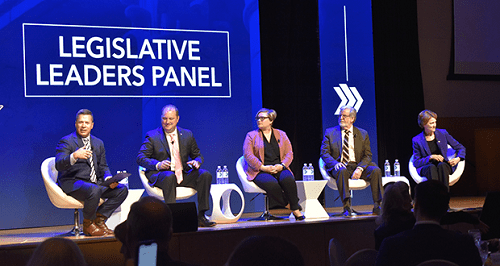
12.8.21 – The Journal Record
More than any other issue – even COVID-19, vaccines or taxes – workforce development is the issue now causing Oklahoma business leaders the most concern.
Attendees of The State Chamber’s Public Affairs Forum, held Wednesday at the National Cowboy & Western Heritage Museum in Oklahoma City, were able to use an app to vote in real time on which issues they want lawmakers to focus on during the legislative session that begins this coming February.
Business leaders had previously been invited to contribute to the development of the State Chamber’s legislative agenda, produced with insights from the chamber’s council of advisors.
Businesses overwhelmingly chose workforce development over reforming the state’s tax structure or reducing the cost of doing business. Employers cited a lack of applicants as the number one barrier to hiring more workers. Business leaders also said they wanted the legislature to focus the expenditure of pandemic relief funds on developing the state’s workforce.
“We have got to be strategic,” said Rep. Jon Echols, R-Oklahoma City, House Majority Floor Leader. The state needs to focus its efforts and resources on producing workers in key industries and specialties, he said.
Many other issues facing the state boil down to the need for workforce development, he said. For instance, “We are not going to increase mental health care in Oklahoma without more mental health workers,” Echols said.
The keynote speaker for the event, CNBC Senior Analyst and Commentator Ron Insana, discussed the many varied reasons why the workforce has not returned on pace with the demand for workers.
Insana said the pandemic affected the economy much like World War I or World War II – the war itself, like the pandemic, temporarily removed workers from the workforce, but after the wars, many were slow to return to the workforce. Some were injured or experienced life changes caused by the war which presented new challenges to workers trying to return.
Traumatized by the events of the pandemic, many workers are rethinking their lives and career choices. Just as after the wars, several soldiers used the G.I. Bill to garner new skills before reentering the workforce, today many are choosing to further their education instead of returning to their old jobs.
Additionally, more former employees are starting their own business ventures, creating the most new startups of any time in U.S. history, Insana said.
The Oklahoma Legislature cannot address all of those issues, said Rep. Emily Virgin, D-Norman, House Democratic Leader, but there are ways lawmakers can reduce or remove some barriers for Oklahomans who want to get back into the workforce.
Affordable childcare would help many women who have been disproportionately affected by the pandemic, Virgin said, and keeping higher education affordable can help more Oklahomans get the training they need to fill good-paying positions.
State Chamber President and CEO Chad Warmington, who moderated the panel, praised Gov. Kevin Stitt and Attorney General John O’Connor for fighting against President Joe Biden’s vaccine mandates. However, Warmington discouraged legislators from taking the fight to the opposite extreme with legislation that would take the decision of whether a business’s workforce needs to be vaccinated out of the hands of employers.
A poll of attendees found that 90% of the business leaders present would prefer the state government leave them the flexibility to make their own choices regarding vaccine mandates.
The two Republican leaders on the panel presented slightly different views on the matter.
“Our caucus has come out in favor of a religious exemption for vaccines,” Echols said. “Our caucus has made it very clear they want more freedom for employees.”
Sen. Roger Thompson, R-Okemah, Chairman of the Senate Appropriations & Budget Committee, gave his personal viewpoint on the matter, rather than speaking for the caucus.
“We’re a right to work state, and if a business owner’s mandates cost them employees and eventually they go out of business, that’s on them,” Thompson said. “(Employees) have the right to work there or not work there. So for me personally, I would have that decision left up to the businesses.”
Sen. Kay Floyd, D-Oklahoma City, said she has repeatedly heard from businesses in her district that the pandemic is still the main disruption to their workforce. Even among the workers they still have, a positive test or quarantine in a local school causes workers who are parents and caretakers to miss work.
The House Democratic Caucus supports the right of businesses to decide regarding vaccines, and the legislature’s job is to ensure “that folks know that the vaccine is the best way out of the pandemic,” Virgin said, “to keep the economy open, to keep people being able to work, to keep schools open, vaccines work.”
